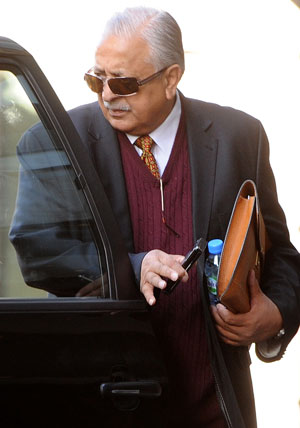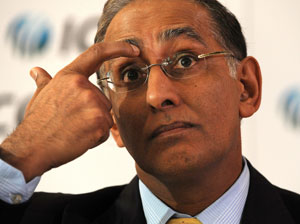Cricket: Series of Shame
By Khalid Hussain | Sports | Published 15 years ago
They say a lot can happen between two summers. In the case of Pakistan cricket, it’s really true.
It was in the summer of 2009, I witnessed Pakistan cricket at its best as Younis Khan’s men crushed Sri Lanka to lift the ICC World Twenty20 crown at Lord’s. Everyone connected to Pakistan cricket — the players, the officials, the fans — was over the moon as Pakistan celebrated their best cricketing moment since the 1992 World Cup triumph Down Under.
Sadly, I was once again at Lord’s in the summer of 2010 to witness what was perhaps Pakistan’s worst cricketing moment as three of the country’s leading cricketers became the subject of a Scotland Yard investigation. It was an incident that rocked world cricket and is now threatening to deal a fatal blow to the sport in our country following growing calls to ban Pakistan from international cricket because of a barrage of match-fixing allegations hurled at them.
From the dizzying heights of international cricketing glory to becoming a subject of suspicion, ridicule and even hatred, Pakistan cricket has completed a full circle within a year.
I arrived in London just after Pakistan concluded their second Test against England at Edgbaston. The tourists were 0-2 down in the series and things were looking gloomy for them ahead of the third Test at The Oval.
Just before the Oval Test, I had a detailed chat with Salman Butt, Pakistan’s Test captain, who was surprisingly upbeat about his team’s chances in the third Test. “All we need is to take our catches,” he told me. Pakistan did that and to everyone’s surprise won the Test to keep the series alive.
But all the good work went down the drain as Pakistan made a mess of the series finale at Lord’s that finished just a day after startling allegations of corruption against Salman and two of his teammates — Mohammad Asif and Mohammad Amir.
It was a Saturday night when the scandal broke and after that cricket just took a backseat. Following allegations hurled by News of the World that Asif and Amir bowled no-balls on order during the Lord’s Test, nobody was talking about the cricket.
The next morning Pakistan went through the motions and came out comprehensively beaten by England, who took the series 3-1.
Many thought Salman Butt and his team would shy away from the media, but the young captain was brave enough to come to a post-match press conference along with his manager Yawar Saeed. However, Salman’s body language wasn’t very positive as he failed to really express himself. He tried to hide behind Yawar but the manager didn’t sound very convincing either.
The tainted trio didn’t talk to the media after that day. The next morning Pakistan’s management decided to take the team to Taunton — a day ahead of schedule for a warm-up match against Somerset. If they thought that Taunton was far from the media glare, they were wrong. Media people had started swarming the team’s hotel in Taunton even before the Pakistan team’s bus arrived there. Salman, Asif and Amir decided to confine themselves to their hotel rooms, but it was only after the trio left for London for questioning by Scotland Yard that things began to move towards normality.
Pakistan beat Somerset in the one-day practice match and then left for Cardiff, but the real action was taking place in London where Wajid Shamsul Hasan, Pakistan’s High Commissioner, decided to act as a saviour for the players. Hasan declared that he believed that the players were innocent, an announcement that forced the International Cricket Council (ICC) to issue a statement suspending the three players. The next morning, Haroon Lorgat, ICC’s chief executive, addressed a press conference at Lord’s and reiterated ICC’s claim that it had zero tolerance for corruption in the sport.
Lorgat didn’t really sound convincing when he was questioned on the ICC’s inaction against alleged match-fixing in cricket. Many now believe that the game’s governing body is to be blamed for the current scenario because in spite of repeated warnings from various quarters, it has failed to keep the sport clean.

PCB Chairman Ejaz Butt. Photo: AFP
Pakistan’s cricket chiefs, too, should be questioned about it. Suspicious characters like Mahzar Majeed, the British businessman at the centre of the spot-fixing scandal, and his brother Azhar, had easy access to the players. Even as the team manager stressed that Pakistan were showing exemplary discipline in England, Azhar and Mazhar were missing with several Pakistan players, taking them out to dinners and parties. There were no night-time curfews as players like Mohammad Asif enjoyed London’s nightlife even when Tests matches were being played at The Oval and Lord’s. The spot-fixing scandal was a disaster waiting to happen.
Many people ask me whether Pakistan’s players are guilty. Personally, I believe that we should wait for Scotland Yard to finish its investigation. It is supposed to have some of the world’s best detectives and if it can’t solve this mystery, then I fear nobody else will succeed either. (You can have your say, vote in the poll below).
However, one thing is clear. Our players need to be chastised. They’ve been warned time and again to stay away from characters like Mazhar Majeed, but to no avail. Asif, who courts controversy as a matter of habit, should be punished. Salman Butt should be questioned about his conduct, which was quite unbecoming, especially since he was Pakistan’s captain on what was a very important tour. People like Amir should be mentored and taught that dignity and strength of character are even more important than sheer talent for one to become a great sportsman.
Nobody expected Pakistan’s exhaustive tour of England to be an easy one. Since 1992, not a single series played between the two nations has taken place without controversy. But nobody was ready for what happened during this particular tour.
It all started with Shahid Afridi agreeing to come out of a four-year Test exile to lead Pakistan in the back-to-back Test series against Australia and England. Publicly, Afridi sounded positive about the tour but privately, he will tell you that his side was not at par with top teams like Australia and England in the Test arena.
Pakistan were crushed by Australia in the first Test at Lord’s but a bigger jolt came immediately after the match when Afridi announced his retirement from Test cricket.
From then onwards, it was a roller-coaster ride that took its worst dip at the twilight stages of the Lord’s Test.
During the best part of the Lord’s match one could feel that there was something bugging the Pakistanis. They were suddenly looking meek as England mustered up a record eighth-wicket partnership to seal the fate of the series decider.
Then came the shocking allegations against Salman, Amir and Asif. In an expose, News of the World alleged that Amir and Asif bowled deliberate no-balls during the Lord’s Test. Mazhar Majeed, who acted as the agent of the three players, was arrested by British Police for an alleged conspiracy to defraud bookmakers. He was later released on bail.
The series went on as Pakistan were comprehensively beaten in back-to-back Twenty20 games in Cardiff and then in the first two One-day Internationals in Durham and Leeds before the tourists bounced back by winning at The Oval and Lord’s. But England crushed Pakistan in the series decider in Southampton to assert their supremacy over the visitors in all three formats of the game.
What happened on the cricket field looked irrelevant as new allegations of corruption surfaced against the Pakistan team, levelled by another British tabloid.
After the third ODI at The Oval, the ICC seemed to jump the gun when it ordered an investigation into the match following a report in The Sun, which alleged that it received information before the game began of some scoring patterns in the match. The Sun said its report was based on details of calls between a person based in Dubai and a bookie in Delhi.

Haroon Lorgat. Photo: AFP
The ICC didn’t even bother to inform the Pakistan Cricket Board (PCB) about it decision to launch a probe into the allegations, leaving the PCB chiefs fuming. And instead of taking on the game’s governing body, PCB Chairman Ejaz Butt, for some strange reason, decided to point his guns at England and alleged that there were talks in the bookie circles that the host team threw the third ODI against Pakistan. The insane remark opened a new front for Pakistan as the England and Wales Cricket Board (ECB) threatened legal action against Butt and demanded financial compensation. Subsequently, Butt travelled to England to apologise in person, for his remarks.
All in all, it has been a crazy few weeks for Pakistan. As a journalist who’s been covering Pakistan cricket extensively, I’m yet to really make sense of all that has happened as far as the match-fixing/spot-fixing scandal is concerned.
Some people have tried to defend Pakistan’s players, arguing that they are under-paid as compared to their counterparts in India, England or Australia. It’s true that Salman Butt can’t even dream of making the sort of money made by Sachin Tendulkar, but that is no excuse to use illegal means to make a quick buck. If the charges levelled against him and the other players are true, then there is no way one can justify their crime.
Personally, I believe that the case against our players is just the tip of the iceberg. Corruption, I’m afraid, has seeped into world cricket and to just focus on Pakistan would be wrong. It’s an open secret that bookie mafias, most of whom are either based in or operated through India, enjoy an alarming influence in the cricket world and unless this problem is acknowledged and addressed, cricket can not really move ahead.
Vote in the poll below:
Is the spot-fixing controversy involving Pakistan’s national squad a conspiracy to tarnish Pakistani cricket?
- No (52%, 150 Votes)
- Yes (46%, 131 Votes)
- Undecided (2%, 14 Votes)
Total Voters: 286
Related Article:
This article originally appeared in the October issue of Newsline under the title “Series of Shame.”
The writer is ranked among the battle-hardened journalists covering sports. As sports editor for The News, he covers sporting action extensively in Pakistan and abroad.


